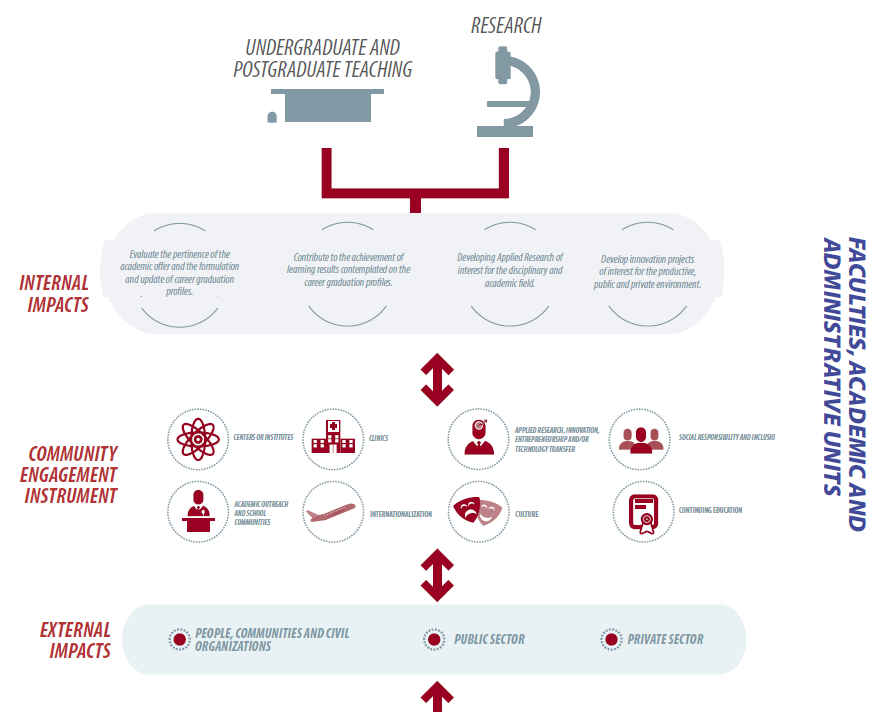Community Outreach Model
The University Institutional Community Engagement Model is the conceptual framework that guides the activities at Faculties, as well as at academic and administrative units to establish a relationship with the environment. Considering the size, geographical location and organizational structure of the University, the definition of the model considers the following characteristics:
- It establishes undergraduate and postgraduate teaching as well as research as the central axis from which Community Engagement at the University originates and towards where it impacts.
- It defines four internal impacts that seek to nurture undergraduate and postgraduate teaching as well as research.
- On a third level, instruments are identified with which the University engages its surrounding.
- It identifies the three areas and groups of interest where an impact of the engagement instruments is expected.
- Finally, it proposes the environment, having into consideration the viewpoint of territories for its design and development.
The diagram below presents the Institutional Community Engagement Model at Universidad Andrés Bello.
Community Engagement Instruments
The following instruments are those created by the Institution for the development of its university endeavor and that follow, through its activities, programs and projects, the Community Engagement institutional policies both at a local, regional, national or international level.
In the context of the policies in this area, the instruments that are here described, correspond to the different components, plans, forms or modes of action.
Centers or Institutes
In accordance to its General Regulation, the University considers the existence of centers and institutes for the completion of more specialized tasks. In practice, these centers and the Public Health Institute have become relevant actors in the development of research, and some of them, are also important instruments in terms of bonding with the community.
Clinics or Clinical fields
The University has various clinics that seek to care for the needs in the population and contribute to the achievement of results in the students’ learning process. These Clinics represent an education instrument that allows to materialize in the curriculum of all courses of study, the pedagogical principles of the Institutional Education Model. The University has the following Clinics seeing to the needs of the surroundings: Judicial, Dental, Psychology, Veterinary and Psichopedagogy.
Applied Research, Innovation, Entrepreneurship and/or Technology Transfer
Applied Research, Innovation, Entrepreneurship and Technology Transfer base their endeavor in multidisciplinary work, generating new knowledge in a collaborative environment shared with government entities, the productive sector, society and the University, both at a national and international level, engaging each of them through specific goals and in a multi-directional manner.
Social Responsibility and Inclusion
For the University, SR is a cross-sectoral skill defined as “label” and linked to the environment through the execution of formal curricular and extra-curricular programs. Additionally, Universidad Andrés Bello has become a reference within the private sector in terms of social responsibility, through the Global Compact program.
UNAB’s Inclusion Program is another activity associated to this instrument, from which various initiatives can be highlighted and that are present in this report.
Academic Outreach and Programs for School Communities
Academic Outreach allows to actively examine academic aspects that are in permanent and interactive construction with society and answer to its needs. Regarding the relationship with School Communities, the Institution seeks to establish partnerships among educational establishments throughout the country and our House of Study, by conducting CE activities and programs that benefit students.
Internationalization
To reach a position of greater excellence and to incorporate itself to the select and small group of high complexity universities existing today in Chile, UNAB accessed effective international partnerships, which made the benefits of globalization accessible to all members of the academic community, in the context of the Laureate Network.
This instrument is also associated to the possibility of generating exchange networks, language training opportunities and dual-degrees programs, among other offers.
Culture
At Universidad Andrés Bello, Culture must be accessible to all members in the university community and open for our most relevant surroundings. Among the initiatives developed in recent times, those promoting a taste for the Fine Arts and Humanities, such as, theater, motion pictures, Camerata at Universidad Andrés Bello, choir, jazz, artistic exhibitions, seminars, cultural meetings, art development courses, among other artistic expressions, are highlighted.
Continuing Education
Continuing Education at Universidad Andrés Bello has as an objective the progress of people, companies and public institutions, through development programs that deliver the necessary professional tools to achieve a good performance in the work world.

